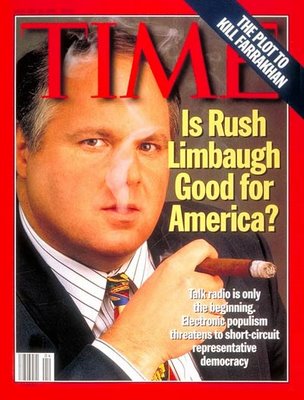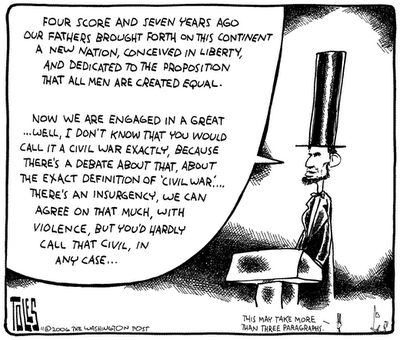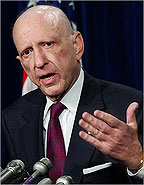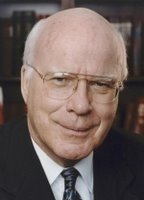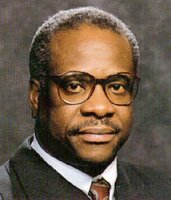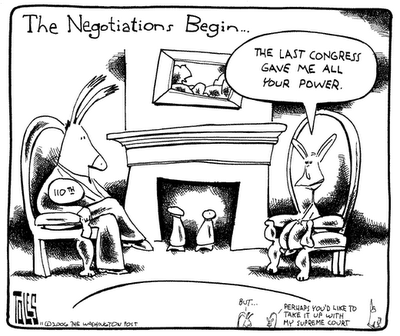
It's grossly unfair, but Laurie David is surely best-known as the
real wife of the brilliant writer-producer Larry David--not to be confused with his fake wife on
Curb Your Enthusiasm. It's unfair because everyone involved in environmental issues knows her as one of the movement's most steadfast activists. (The biographical note that accompanies the piece below from Sunday's
Washington Post reads, "Laurie David, a producer of
An Inconvenient Truth, is a Natural Resources Defense Council trustee and founder of StopGlobalWarming.org.")
Keith Olbermann reported this story on last night's
Countdown, but there's so much interesting detail in it--and the devil is always in the details--that I thought you might be interested in
her own telling of it:
Science a la Joe CamelBy Laurie David
Sunday, November 26, 2006; B01

At hundreds of screenings this year of "An Inconvenient Truth," the first thing many viewers said after the lights came up was that every student in every school in the United States needed to see this movie.
The producers of former vice president Al Gore's film about global warming, myself included, certainly agreed. So the company that made the documentary decided to offer 50,000 free DVDs to the National Science Teachers Association (NSTA) for educators to use in their classrooms. It seemed like a no-brainer.
The teachers had a different idea: Thanks but no thanks, they said.
In their e-mail rejection, they expressed concern that other "special interests" might ask to distribute materials, too; they said they didn't want to offer "political" endorsement of the film; and they saw "little, if any, benefit to NSTA or its members" in accepting the free DVDs.
Gore, however, is not running for office, and the film's theatrical run is long since over. As for classroom benefits, the movie has been enthusiastically endorsed by leading climate scientists worldwide, and is required viewing for all students in Norway and Sweden.

Still, maybe the NSTA just being extra cautious. But there was one more curious argument in the e-mail: Accepting the DVDs, they wrote, would place "unnecessary risk upon the [NSTA] capital campaign, especially certain targeted supporters." One of those supporters, it turns out, is the Exxon Mobil Corp.
That's the same Exxon Mobil that for more than a decade has done everything possible to muddle public understanding of global warming and stifle any serious effort to solve it. It has run ads in leading newspapers (including this one) questioning the role of manmade emissions in global warming, and financed the work of a small band of scientific skeptics who have tried to challenge the consensus that heat-trapping pollution is drastically altering our atmosphere. The company spends millions to support groups such as the Competitive Enterprise Institute that aggressively pressure lawmakers to oppose emission limits.
It's bad enough when a company tries to sell junk science to a bunch of grown-ups. But, like a tobacco company using cartoons to peddle cigarettes, Exxon Mobil is going after our kids, too.
And it has been doing so for longer than you may think. NSTA says it has received $6 million from the company since 1996, mostly for the association's "Building a Presence for Science" program, an electronic networking initiative intended to "bring standards-based teaching and learning" into schools, according to the NSTA Web site. Exxon Mobil has a representative on the group's corporate advisory board. And in 2003, NSTA gave the company an award for its commitment to science education.
So much for special interests and implicit endorsements.
In the past year alone, according to its Web site, Exxon Mobil's foundation gave $42 million to key organizations that influence the way children learn about science, from kindergarten until they graduate from high school.
And Exxon Mobil isn't the only one getting in on the action. Through textbooks, classroom posters and teacher seminars, the oil industry, the coal industry and other corporate interests are exploiting shortfalls in education funding by using a small slice of their record profits to buy themselves a classroom soapbox.
NSTA's list of corporate donors also includes Shell Oil and the American Petroleum Institute (API), which funds NSTA's Web site on the science of energy. There, students can find a section called "Running on Oil" and read a page that touts the industry's environmental track record--citing improvements mostly attributable to laws that the companies fought tooth and nail, by the way--but makes only vague references to spills or pollution. NSTA has distributed a video produced by API called "You Can't Be Cool Without Fuel," a shameless pitch for oil dependence.
The education organization also hosts an annual convention--which is described on Exxon Mobil's Web site as featuring "more than 450 companies and organizations displaying the most current textbooks, lab equipment, computer hardware and software, and teaching enhancements." The company "regularly displays" its "many . . . education materials" at the exhibition. John Borowski, a science teacher at North Salem High School in Salem, Ore., was dismayed by NSTA's partnerships with industrial polluters when he attended the association's annual convention this year and witnessed hundreds of teachers and school administrators walk away with armloads of free corporate lesson plans.

Along with propaganda challenging global warming from Exxon Mobil, the curricular offerings included lessons on forestry provided by Weyerhaeuser and International Paper, Borowski says, and the benefits of genetic engineering courtesy of biotech giant Monsanto.
"The materials from the American Petroleum Institute and the other corporate interests are the worst form of a lie: omission," Borowski says. "The oil and coal guys won't address global warming, and the timber industry papers over clear-cuts."
An API memo leaked to the media as long ago as 1998 succinctly explains why the association is angling to infiltrate the classroom: "Informing teachers/students about uncertainties in climate science will begin to erect barriers against further efforts to impose Kyoto-like measures in the future."
So, how is any of this different from showing Gore's movie in the classroom? The answer is that neither Gore nor Participant Productions, which made the movie, stands to profit a nickel from giving away DVDs, and we aren't facing millions of dollars in lost business from limits on global-warming pollution and a shift to cleaner, renewable energy.
It's hard to say whether NSTA is a bad guy here or just a sorry victim of tight education budgets. And we don't pretend that a two-hour movie is a substitute for a rigorous science curriculum. Students should expect, and parents should demand, that educators present an honest and unbiased look at the true state of knowledge about the challenges of the day.
As for Exxon Mobil--which just began a fuzzy advertising campaign that trumpets clean energy and low emissions--this story shows that slapping green stripes on a corporate tiger doesn't change the beast within. The company is still playing the same cynical game it has for years.
While NSTA and Exxon Mobil ponder the moral lesson they're teaching with all this, there are 50,000 DVDs sitting in a Los Angeles warehouse, waiting to be distributed. In the meantime, Mom and Dad may want to keep a sharp eye on their kids' science homework.
laurie@lauriedavid.com




